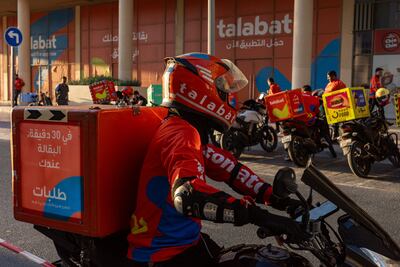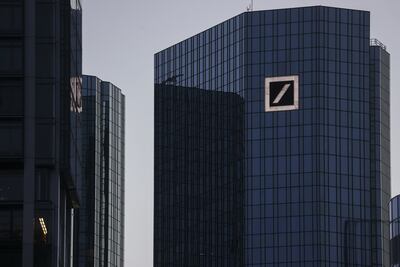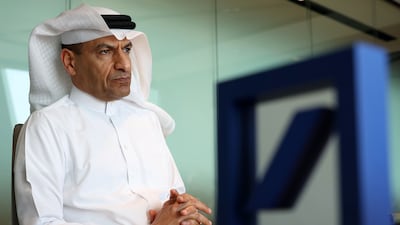Jamal Al Kishi is back at the helm of Deutsche Bank’s Middle East and Africa operations after a four-year hiatus. His mandate: bring the German lender out of dormancy and grab a bigger slice of the region’s investment banking, wealth management and corporate banking markets.
“It's fair to say that the focus over the last few years has not been on expanding our market share or doing more business with clients … but that has definitely now changed,” Mr Al Kishi told The National in an interview in Dubai.
“This is the main reason I am back because I have been asked by the management board to come in and preside over a new phase of our expansion in the region.”
The stance that the Frankfurt-headquartered bank took over the past five years to maintain and nurture relationships with existing clients and not on-board new ones has nothing to do with the region and it certainly is not a case of a lack of growth prospects in Middle East and African markets.
“That was a reflection of a global realignment and housekeeping at a macro level within the group, which necessitated a certain position of being conscious of what needed to be done to solidify our franchise in the region, [and] keep it intact,” said Mr Al Kishi, who began his second stint as chief executive of the Middle East and Africa region in April this year.
Deutsche Bank, the biggest in Germany and ninth-largest in the EU, has held back growth initiatives while its regional and international peers significantly increased resource allocation in the region to capitalise on growth opportunities.
In July 2019, chief executive Christian Sewing launched plans to radically transform the bank’s business model in a bid to increase profitability, improve shareholder returns and drive long-term growth by significantly downsizing its investment banking operations, boost retail banking business and cut total costs.
Retail banking revenue has now outgrown investment banking; however, the sailing has not been smooth in the past five years. In February, the lender said it plans to cut 3,500 jobs, or about 4 per cent of its workforce worldwide by the end of next year.

The MEA markets, which include Saudi Arabia and the UAE, the two biggest Arab economies as well as other members of the Gulf economic bloc, have maintained significant economic momentum since bouncing back from the Covid-19 pandemic-driven slowdown in 2020.
In the past few years, international financial institutions, regional banks and global asset managers have either expanded their operations or have set up new offices in the Gulf region to attract more business from sovereign wealth funds, family offices, ultra-high-net-worth individuals and large institutional clients. Growing financing needs to fund the respective economic diversification drives of sovereigns in the region have also necessitated expansion in corporate banking teams.
The sustained momentum in regional initial public offerings and a robust rise in the debt capital market activity have also prompted financial institutions to expand their investment banking operations.
Quantitative targets
Mr Al Kishi said Deutsche Bank is not late in the game in terms of rebooting growth in MEA markets and the bank is more than capable of building on its roots and coming out of relationship maintenance mode to expansion mode.
“That's a phase that has ended, and we are now in a new phase of wanting to grow our business with existing clients as well as new clients, attaining market share again across the three verticals and that is the main reason I am back,” he adds.
Middle East and Africa chief executive at Deutsche Bank
The bank doesn’t have definitive “quantitative targets” yet, as the strategies for various countries and the different products are being formulated.
“It's a process that began shortly after I rejoined … and [plans] are making their way at the moment to the upper management in the bank and the management board,” he said. The lender’s management board is fully behind the agenda and is very bullish on the MEA region.
“They see the region as a key growth engine for the group,” said Mr Al Kishi. “The support is there and sign-off on the specific strategies for products and countries, that's the work that will be completed over the next few months.”
Mr Al Kishi, a 30-year banking veteran, is no stranger to Deutsche Bank or the regional banking landscape. He returns to Deutsche Bank after spending four years as chief executive of Gulf International Bank in Bahrain. He previously served as MEA chief executive at Deutsche Bank from 2016 to 2020 and before that, held a variety of senior management positions with the German lender including chief country officer of Saudi Arabia.
Regional growth momentum
Saudi Arabia and the UAE are the two biggest markets for the bank and will lead growth for the lender in the broader region.
The level of macroeconomic activity in both markets is “phenomenally conducive to us achieving massive growth in both” as their leadership, despite regional tensions, is diversifying economies in ways “the world has never seen in the past”, he said .
“I say this with a great deal of conviction, that yes, there might be ebbs and flows with crude prices necessitating certain recalibration of the execution plans but the determination at the very top in both countries to pursue these programmes is rock solid and the scope for what we can deliver as a global bank with roots in the region has never been wider.”
Saudi Arabia, Opec’s biggest oil producer, earlier this year said it is rationalising spending on its Vision 2030 projects which include some of the biggest development initiatives in the region including the $500-billion futuristic city of Neom and The Red Sea Development.
The capital requirements for some of the mega projects as well the kingdom’s push to expand its non-oil industrial base has opened new avenues of business for lenders over the past few years, and Mr Al Kishi said even with rationalised spending, growth potential both in lending and advisory business remains robust.
“There are some of us that see 2030 as a destination but the Vision 2030 was never conceived as a destination. It was always meant to be a milestone by which time we were supposed to measure progress on key initiatives that the kingdom wanted to pursue,” he explained. “Will they be successful in pursuing every programme and every initiative, the answer is, no and that's natural. But even if they achieve success in a small fraction of everything that is being attempted, Saudi Arabia is transformed, and the region [along with it] is transformed in unimaginable ways.”
Middle East and Africa expansion drive
While elsewhere, the bank may be on a cost-cutting drive, the broader Middle East and Africa region – which also includes markets such as South Africa, Egypt, Pakistan and Turkey – is expanding.
The lender has added more bankers to its wealth management team in recent months to expand its offering to affluent clients in the region and plans to increase the headcount elsewhere in corporate and investment banking teams next year, Mr Al Kishi said.

“We've added around 20 people in the past year for the wealth management team in the region … so there has been a major incremental increase in head count deployed on the wealth side, and more is on the way,” he said. “We will be adding a handful [of wealth bankers] more, mainly in Saudi Arabia.”
He expects the lender’s corporate finance and investment banking businesses to grow aggressively, despite being behind the curve.
“Should our business on investment banking platform be it on the fixed income side, or on the corporate finance side; should it be growing on the advisory side for M&A, equity capital markets or debt capital markets, [yes] absolutely,” he said.
“I don't think we should be thinking that one area [of the business] will fall way behind the rest, because I think there is a lot of demand across the region."
Although there are a lot of players in the region, Deutsche Bank has invested in the region over the years in platforms and products that serve clients well.
“I don't think that our market share today reflects the unique position and our strengths as a global firm in the region, but I know that we have, the determination from the board, we have the determination and conviction of our people in the region, as well as support from our clients in the region to go and actually do a lot better,” he said. Going forward, the “market share quantum, per se”, will depend on the geographies and different sectors, however “we should aspire to achieve a mid-single digit to a high single digit market share”, he adds.
The Middle East and Africa region currently is “not the largest contributor to numbers” at the group level, however, it has the potential to be among the top contributors to Deutsche Bank's results after Europe, Asia and the Americas.
“I do not want to be sitting like a distant fourth, he said. “Frankly, that's where we want to be.”
While the bank is expanding in the region, Mr Al Kishi said the aim is to run a cost-effective operation and there is no rush to expand in the markets beyond where it already has a footprint.
“The idea is to run as lean and as efficient a platform as possible, and if we can serve a jurisdiction from some of the other hubs that we have in the region, that is our default position,” he adds.
However, if it becomes necessary and viable from a value accretion perspective to actually have a new presence, the bank will not rule that out.
“But we, as you might have seen through our history, we're slow to open offices and we're much slower to close them down and we don't like to, once we set up shop in a place … want to be fickle.”


